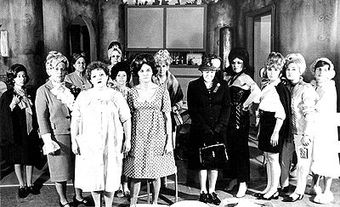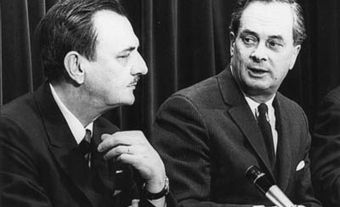Les insolences du Frère Untel (The Impertinences of Brother Anonymous) is a collection of pamphleteering texts written in 1960 by Jean-Paul Desbiens (Brother Pierre-Jérôme). The publication criticized the state of culture and education in Quebec at the time. It examined the education system and the omnipresence of the clergy in the public sphere. The book proposed a major political and societal overhaul. It sparked great debate in French-Canadian society. (See also Quiet Revolution.) It provided a framework for a major reform of Quebec’s education system. Les insolences du Frère Untel became Quebec’s number one literary bestseller, selling over 100,000 copies in just a few months.
A Bold Text is Penned
It all started on 21 October 1959 when the editorial writer and editor-in-chief of Le Devoir, André Laurendeau, published an article in the newspaper under the pseudonym Candide, entitled “La langue que nous parlons" ("The language we speak"). He criticized the quality of the French language taught in Quebec schools and spoken by the younger generation, which he described as “speaking joual,” popularizing the use of the expression at the time.
A few days later, he received a letter from a young teacher, Marist Brother Pierre-Jérôme ― Jean-Paul Desbiens by birth name ― who shared his concerns. Convinced of the importance of this message, Laurendeau was touched by his correspondent’s unique style and by the fact that the author was a brother teacher who was experiencing these difficulties from the inside. Furthermore, in 1959, it was forbidden for a brother to publicly criticize or express indignation. Originally not intended for print, this first letter was written personally to the editor of the daily newspaper. Within a few days, Laurendeau convinced Desbiens to have his letter published under the pseudonym of Frère Untel. It was published on 3 November 1959. Ten other letters from Frère Untel were published between November 1959 and August 1960. Desbiens criticized the poor language, the fear-based religion and the archaic education system.
Pitfalls and Publication
Finally, the publication of a collection of these letters was planned for the start of the 1960 school year. However, Brother Pierre-Jérôme’s (see Jean-Paul Desbiens) religious community ordered him to discontinue all public activities and to stop the publication of the upcoming book, or risk being expelled from his congregation. However, he had already signed a contract with Jacques Hébert, the editor and cofounder of Éditions de l’Homme, who now owned the manuscript. The assistant to the Superior General of the Marist Brothers was willing to pay whatever it took to buy the cancellation of the publication, even though the work was already in print. Hébert wanted to keep Brother Pierre-Jérôme out of trouble, but he found the material too important to abandon. He consulted canonist Canon Racicot, a specialist in Catholic Church law, who comforted him and encouraged him to persevere.
On 6 September 1960 the book Les insolences du Frère Untel was published. It echoed the same themes as the letters: freedom, language quality, culture and excellence.
Its editor, Jacques Hébert, described the event as follows:
On the evening of its publishing, the whole of Montreal was at the old university circle on Sherbrooke Street. There was a lot of electricity in the air. We could all sense that this was no ordinary launch. What we didn’t know yet was that the “Quiet Revolution” had begun – even the expression didn’t exist yet. On 6 September 1960, freedom had finally had the last word.
Report on the Quality of French in the School System
The book is based on Jean-Paul Desbiens’ experience as a brother teaching philosophy in Chicoutimi and Alma, in Saguenay-Lac-Saint-Jean. He exposed the shortcomings of the educational system and blamed it on the incompetence and irresponsibility of the clergy-controlled Department of Public Instruction.
For example, concerned about the quality of writing at school, he recounted an exercise. He had asked his Grade 11 students to write the first stanza of the Canadian national anthem, and the results were appalling. The students ended up writing several versions of O Canada in joual. Most students had written the lyrics phonetically.
He blamed joual for many problems, this "boneless language" being the symptom of a wider issue: "Our students speak joual because they think joual, and they think joual because they live joual, like everyone else around here."
The author is a pioneer and visionary in proposing the standardization of commercial signage. He believed that legislation was needed to give priority to the French language on advertising in Quebec.
Since language is a common good, he suggested that the government should support French in the same way as it does animal species: “The government protects national parks, and rightly so: they are common goods. Language is also a common good, and the government should protect it just as rigorously. An expression is worth a moose, a word is worth a trout.” (See Quebec Language Policy.)
Criticism of Religion
Brother Pierre-Jérôme’s (see Jean-Paul Desbiens) letters also criticized the climate of fear in which the Catholic region in Quebec is based. He described Catholicism in French-Canadian society as “tense, frightened, ignorant” in the face of the Conquest of New France ― “a counter-reformation Catholicism,” largely reactionary.
André Laurendeau also noted that Brother Pierre-Jérôme’s first published letter had prompted several replies. However, they were all anonymous, illustrating the effect of the climate of fear in Quebec.
Influence
In Les insolences du Frère Untel, Jean-Paul Desbiens predicted the Church’s loss of power in the various spheres it controlled. The debates on the place of religion in the lives of citizens became an important legacy in Les insolences du Frère Untel. It led the Quebec government to develop a leading role in education and health ― areas that were mainly occupied by religious congregations at the time. (See Secularism in Quebec.)
In 1961, the Quebec government set up the Royal Commission of Inquiry on Education in the Province of Quebec, also known as the Parent Commission. In 1963, the Parent report led to the creation of Quebec’s first Ministry of Education, which implemented major changes to the Quebec school system.

 Share on Facebook
Share on Facebook Share on X
Share on X Share by Email
Share by Email Share on Google Classroom
Share on Google Classroom



